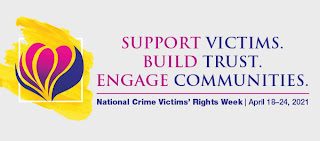The theme of this year’s National Crime Victims’ Rights Week (April 18-24) aligns perfectly with the mission of the California Victim Compensation Board: Support Victims. Build Trust. Engage Communities.
Since 1965, CalVCB has stayed committed to
supporting victims. We understand trauma was not your choice, but support is
your path forward, and we take our role in victims’ recovery to heart. Last
fiscal year, more than 50,000 victims applied for financial assistance to help
flee their abusers, seek mental health treatment and cover income loss due to a
crime.
Our job is so much more than approving claims
and authorizing compensation. Victims and victim advocates turn to us for
information and resources. We also help with questions about filling out
applications, uploading documents and understanding the compensation
available.
Today, about half of applicants go to CalVCB’s
website to use an online portal to file electronically. CalVCB is working on expanding the portal to
give greater access to victim advocates in all 58 counties. In August 2020,
CalVCB began testing a new feature in four counties: San Joaquin, San
Francisco, San Diego and Fresno. The idea is to simplify and expedite the
application process. Advocates in those four counties can create an account,
track the applications in which they are the representative, upload documents
and bills, create an account and complete an application for a victim. The
expanded CalVCB Online Advocate Portal is scheduled to roll out statewide later
this year.
In addition to online applications, CalVCB
continues to process paper applications submitted by mail. We offer applications in 14 languages and can assist victims to obtain an application in a different
language than we have available.
For
victims who do need help, CalVCB’s Customer Service hotline operates from 8
am-5 pm Monday-Friday and can be reached at 800-777-9229. You may also contact
a county Victim Witness
Assistance Center with questions or help filling out an application.



